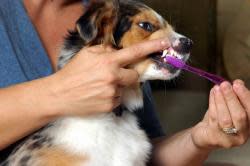February is National Pet Dental Health Month
By WebVet.com

When it comes to dental care for dogs and cats, prevention is the strategy, just like it is for people. That's why February -- National Pet Dental Health Month -- is the perfect time to remind animal lovers that caring for your pet's teeth is crucial to his or her overall health.
WebVet: Caring for your pet's dental health
Webvet is here to address the significance of oral health care for pets, and answer your burning questions about your pet's dental issues!
Do dogs and cats get dental disease just as people do?
Pets don't get a lot of cavities, but often develop plaque buildup that leads to the red, inflamed gums associated with gingivitis. Over time, bacterial plaque can destroy the bone that holds the tooth in place, leading to tooth loss and even blood infection.
How do I know if my pet is having dental problems?
Early problems show few signs, expect for bad breath and a buildup of gummy film (plaque) around the sides of the tooth. As the problem progresses, grayish-brown plaque becomes more noticeable, the gums become red and sore, and your pet may not want to chew hard food or toys.
How can dental problems be prevented?
Just like us, our pets need regular dental checkups to keep their teeth and gums healthy. Dry food, chew toys, and nylon bones are also good ways to stimulate gums and limit plaque buildup. It's also a good idea to brush your pet's teeth regularly with a toothpaste specifically developed for pets.
Can pets get their teeth cleaned just like people?
Regular (eg, yearly) dental cleaning is needed to remove plaque buildup on teeth and gums. The process is similar to that used in people, except that thorough cleaning in pets requires general anesthesia.
Check out more from Webvet!
